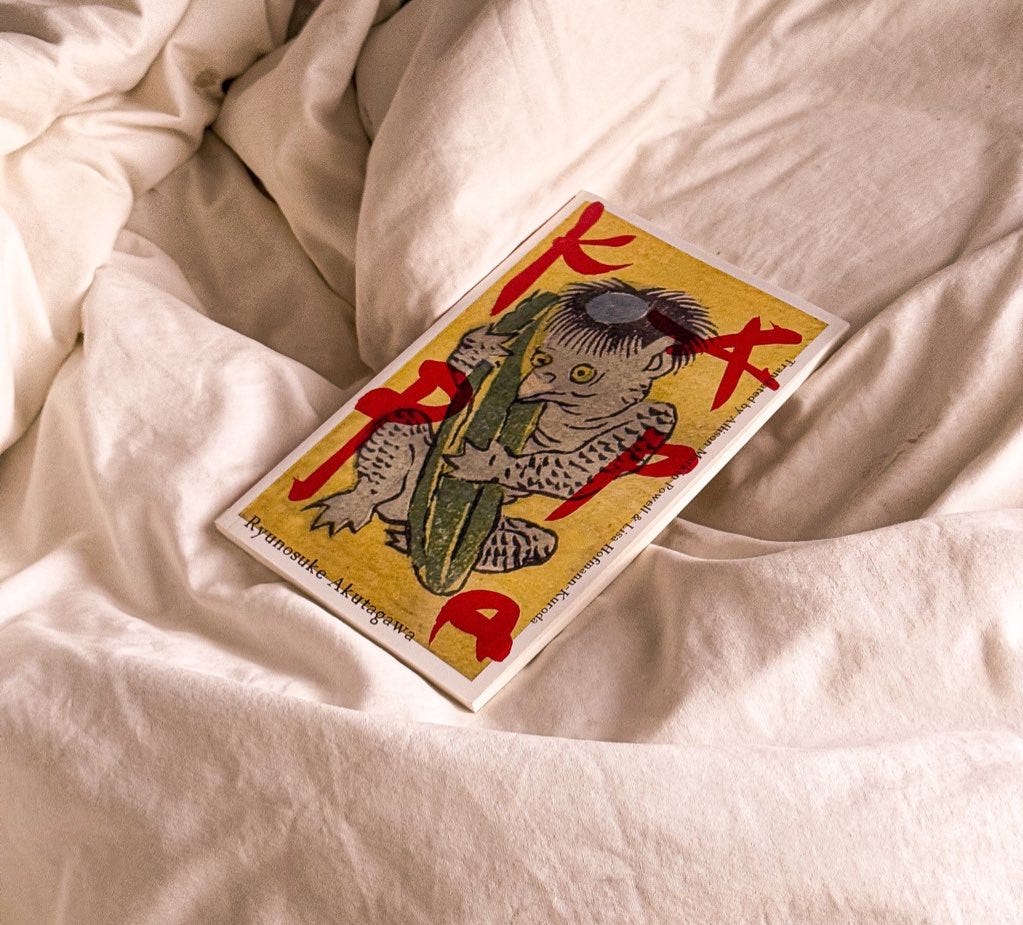Kappa by Ryunosuke Akutagawa
Cosmic Review Entry 003: Perceived as a children's book but is relevant in the mockery of the society
"In other words, we begin and end in absurdity."
Akutagawa was known to be a master of short stories at his time, and Kappa was one of the short stories that he wrote presumably before he fell to his death by unaliving himself. And if you’re a fan of Japanese classic authors like Osamu Dazai who looked up to Akutagawa as an author, Kappa had became a prominent work in more ways than people could have imagined. It was perceived as a children’s book at some point of time, but, its always classics like these that can still hold its relevance even after years of its publication. And Akutagawa is an author that holds a presence even till this day with his writing.
Kappa as a yokai, but Akutagawa described them as almost human.
Kappa was one of the monsters in Japanese Folklore that is written to be monstrous, hideous and has similar physical attributes like a frog. Its also known as a river child as its a monster-dwelling creature that takes over the ponds and rivers in Japan.
Given that its a yokai - a monster that is put on signs of rivers in Japan (even until now) for warnings, Akutgawa had written Kappas in such a way that its almost human at best. There is almost a humourous and light tone from the narration of Patient 23 and his adventures in Kappa Land when he accidentally fell down a hole on the surface, but if dived deeper, the realities that mirrors the human world and the acts of the Kappas in Kappa Land are eerily similar.
From capitalism, to loneliness, to abuse of power (both with men and women), to corruption - Akutagawa had reflected the society at the time an almost similar behaviour with Kappas - which goes to say, humans are no better than monsters at some point of time.
As short as the novella is, I love how impactful it is. Its absurd in more ways than one, and reading about it makes you laugh at some points on how preposterous some things can be perceived, but it goes to show, how well Akutagawa has written this book. And through the antiques of the Kappas that Patient 23 met, the concept of death is often brought up in the story. It made me wonder the state of mind of Akutagawa at the time, especially when parts about death and suicide was reflected through the lens of a Kappa Poet - which for me, is in the reflection (in some sense) on how he felt as a writer at the time (this we’ll never know, but I do wonder at times). The loneliness and the perception of death from the lens of a psyciatric patient might be telling in leading to the actual unaliving of Akutagawa’s death as well.
"Well, since I'd been feeling so depressed, I thought I'd try looking at the world upside down. But turns out, it's exactly the same."
There is more to this book than meets the eye. If I were to go deeper into each part, this would be almost a rambling-of-sorts-post. Akutagawa is a master of craft in his own way and in the world of Kappa that is built by Akutagawa, monsters and humans are almost similar in ways that we don’t want to admit. The jests through familiar author names to the ways that human’s ways are compared to the Kappa’s way of mind, this book is a hidden gem on its own.
For my first read of 2025, it’ll definitely be a memorable read for me. And I hope that it would be one for you too.
4.25🌟 for this gem. Absolutely ate it up.




